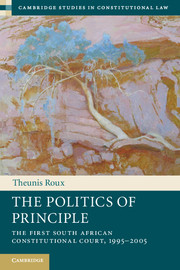Book contents
- Frontmatter
- Contents
- Acknowledgements
- Introduction
- Part I Problematic, Theory, Methodology
- Part II Context
- Part III Thematic Case Studies
- 6 Death, desire and discrimination: the Chaskalson Court between constitutional and positive morality
- 7 Social rights
- 8 Property rights
- 9 Political rights
- 10 Cross-cutting strategies
- Conclusion
- Bibliography
- Index
- References
10 - Cross-cutting strategies
Published online by Cambridge University Press: 05 April 2013
- Frontmatter
- Contents
- Acknowledgements
- Introduction
- Part I Problematic, Theory, Methodology
- Part II Context
- Part III Thematic Case Studies
- 6 Death, desire and discrimination: the Chaskalson Court between constitutional and positive morality
- 7 Social rights
- 8 Property rights
- 9 Political rights
- 10 Cross-cutting strategies
- Conclusion
- Bibliography
- Index
- References
Summary
The last three chapters have focused on three different sets of constitutional rights and shown how the Chaskalson Court’s case law in each of these areas reflected the judges’ concern for the Court’s independence. Both the content given to constitutional rights and also the approach taken to standards of review, these chapters have argued, were influenced by the judges’ perception of the possible impact of their decisions on the Court’s capacity to continue performing its institutional role over the long run.
This chapter changes tack somewhat. Instead of confining itself to a single set of rights, it addresses three cross-cutting strategies that the judges may be seen to have deployed in the cases already studied. The first such strategy concerned the Court’s separation of powers doctrine in the narrow sense, i.e. its case law on the nature and limits of its role in enforcing constitutional norms. The importance of this issue lies in the fact that it was this aspect of the Court’s case law through which the judges might have attempted to address some of their concerns about the Court’s independence in a publicly accessible and consistent way. If the Court’s separation of powers doctrine can be shown to have been principled in this sense, many, if not all, of the doctrinal choices that this study has attributed to the extra-legal influence of the political context in which the Court found itself would be re-appropriated for the realm of the legal – absorbed back, that is, into the morally persuasive and coherent account of the post-apartheid Constitutions that the judges all along purported to be giving. On the other hand, if the development of the Court’s separation of powers doctrine can itself be shown to have been subject to concerns about the Court’s independence, then this aspect of its case law will provide further support for this study’s central contention.
- Type
- Chapter
- Information
- The Politics of PrincipleThe First South African Constitutional Court, 1995–2005, pp. 365 - 386Publisher: Cambridge University PressPrint publication year: 2013

